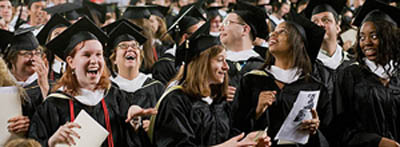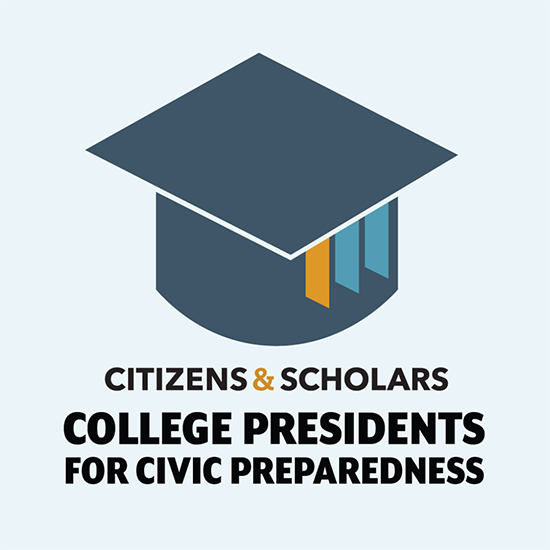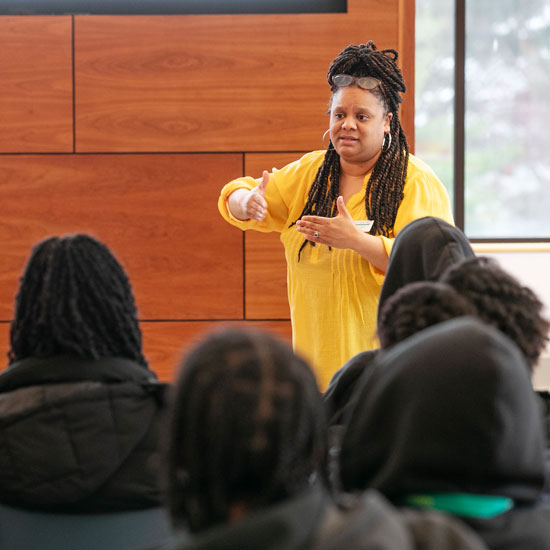At 100th commencement, College awards degrees to 652
 A week of gloomy skies yielded to almost unequivocal sunshine on May 21 as Skidmore
College, observing its 100 th commencement ceremony, awarded degrees to 652 members of the Class of 2011 and marked
the closing of University Without Walls, the liberal arts degree-completion program that Skidmore founded in 1971 as an experiment
in non-traditional education.
A week of gloomy skies yielded to almost unequivocal sunshine on May 21 as Skidmore
College, observing its 100 th commencement ceremony, awarded degrees to 652 members of the Class of 2011 and marked
the closing of University Without Walls, the liberal arts degree-completion program that Skidmore founded in 1971 as an experiment
in non-traditional education.
Thirty of the seniors who received bachelor's degrees earned them through UWW, which since its first commencement in 1975 has awarded degrees to more than 1,500 students. The College also awarded an honorary degree to a 2001 UWW graduate: Colin E. Greene,principal of the largest secondary school in the Caribbean island of Antigua, member of the board of Education International, and leader for equitable access to quality education in developing countries.
"Our UWW students brought to their liberal arts education a rich tapestry of life experiences, they were well-positioned to appreciate the value of what they learned, and in the process they transformed both their own lives and some portion of the world," said President Philip A. Glotzbach. "We salute the UWW graduates with us here today, and with them all the UWW graduates from times past."'
The College awarded masters of arts in liberal studies degrees to ten students. Others recognized with honorary degrees were James M. McPherson, the George Henry Davis '86 Professor of American History Emeritus at Princeton University, and greatest living scholar of the American Civil War, and Anne Bogart, American theater director, co-founder and artistic director of the SITI Company.
"You graduates are the recipients of a great gift - you have been given the opportunity to spend four years sampling the accumulated wisdom of human kind, the best of what our species has learned over seven millennia of recorded history," President Glotzbach told the Class of 2011. "As you go forward, please continue to broaden and deepen your liberal education; you are by no means finished with this process. But as you do, please also find in yourself the courage necessary to take advantage of those everyday moments that occur in all of our lives to prove that you understand - and can put to use - just what these four years have been all about."
In keeping with a tradition that dates back to 1982, the Schenectady Pipe Band led
the academic procession into the main hall of the Saratoga Performing Arts Center,
which was festooned with a large "100 th Commencement" banner. In keeping with a newer tradition established by the Class
of 2010, the graduating seniors stood up and briefly danced after Alexandra Stark
and Jared Greenbaum announced the senior class gift. (This year's song was the Isley
Brothers' "Twist and Shout". Last year's was "Shout" by the Isley Brothers.)
In the 100-year history of Skidmore commencements, this was the first to be streamed
live on the Web. About 200 family members and friends tuned in, according to Media
Services.
What They Said
The full text of remarks delivered by President Glotzbach; Elizabeth Gronquist, president of the Senior Class; the three honorary degree recipients, and Erica Bastress-Dukeheart, who spoke on behalf of the faculty, are available by clicking on each name. Following are excerpts.
Philip A. Glotzbach
President
 It is no secret that the United States and, indeed, most of the countries of the world
now confront a roster of profoundly challenging issues too long and daunting to list
here ? and after all, this is supposed to be a day of celebration. But I will say that to address those issues will require all of us ? and most especially
our political leaders ? to become more courageous.
It is no secret that the United States and, indeed, most of the countries of the world
now confront a roster of profoundly challenging issues too long and daunting to list
here ? and after all, this is supposed to be a day of celebration. But I will say that to address those issues will require all of us ? and most especially
our political leaders ? to become more courageous.
We need to find the courage, collectively, to name our problems and face them head-on,
as opposed to pretending that they do not exist and hoping they will go away. Specifically, we need to find the courage to engage in actual, serious conversations
regarding those issues - as opposed to separating into ideologically defined camps
and shouting at one another from the safety of our individual perspectives. Unfortunately,
it is far too easy for leaders to enjoy short-term success by dividing communities
and nations. By contrast, to be a leader who brings people together in genuine dialog requires
far more skill and, again, much greater courage. As citizens of this democratic republic, all of us have a role in demanding - of
both ourselves and our political leaders - the courage to replace acrimonious debate
with fierce but genuine conversation. Doing so, I believe, is the only way for us to make smarter political decisions in
the future than we have in the past.
Anne Bogart
American theater director; co-founder and artistic director of the SITI Company  When in doubt, listen to the body. The body as barometer is a simple notion. The
body constantly receives myriad impressions from multifarious sources: from temperature,
visual stimulus, sound, ideas, suggestions, people, odors, colors, and so on. But
the instantaneous journey of the body's responses to these stimuli is not so simple,
because the physical sensations are immediately met by and intertwined with your memory,
associations, ingrained prejudice, long-term goals, and learned responses. And in
this way, your own body - which is so wrapped up in, and ultimately not separate from,
the world around it - can instantaneously let you know, simply by the level of excitement
and energy generated, what needs attention.
When in doubt, listen to the body. The body as barometer is a simple notion. The
body constantly receives myriad impressions from multifarious sources: from temperature,
visual stimulus, sound, ideas, suggestions, people, odors, colors, and so on. But
the instantaneous journey of the body's responses to these stimuli is not so simple,
because the physical sensations are immediately met by and intertwined with your memory,
associations, ingrained prejudice, long-term goals, and learned responses. And in
this way, your own body - which is so wrapped up in, and ultimately not separate from,
the world around it - can instantaneously let you know, simply by the level of excitement
and energy generated, what needs attention.
Similarly a sensation of numbness can indicate what to avoid. For me, one of the
strongest and most useful signals that the body can generate for important decisions
are goosebumps, or what the French perhaps more poetically call "frisson du corps."
I have found that the goosebumps factor is most useful when making an important decision
or deciding which path to take. When I receive a frisson du corps, I act. When I
do not feel the goosebumps factor, I do not. That simple.
Colin E. Greene, UWW '01
Principal of the largest secondary school in the Caribbean island of Antigua, member
of the board of Education International, and leader for equitable access to quality
education in developing countries. Stories sometimes have the strangest ways of developing a most unusual plot. A relationship with Skidmore College is such an unusual plot. How does a boy from a sunny Caribbean island came to be associated with the noted
snow of Skidmore College and Saratoga Springs? It was my thirst for knowledge and my search for an education that would be tailored
to the individual needs that brought me to Skidmore and to the University Without
Walls. I want to thank Skidmore for that experience and for the vision that it has created.
Even more so, I wish to celebrate today the opportunities that this relationship
has made into realities. I want to celebrate the notion that simple ideas can blossom into something wonderful.
I remember speaking to Corky Reinhart about Skidmore College forming a relationship
with teachers in my own country. And about how I would count it a success if 10 individuals would be able to access
quality higher education at a reasonable cost and easily accessible. I am proud to tell you that we have not only 10, but that partnership has seen over
60 graduates of Skidmore College (UWW) in a small island that had no idea where Saratoga
Springs was.
Stories sometimes have the strangest ways of developing a most unusual plot. A relationship with Skidmore College is such an unusual plot. How does a boy from a sunny Caribbean island came to be associated with the noted
snow of Skidmore College and Saratoga Springs? It was my thirst for knowledge and my search for an education that would be tailored
to the individual needs that brought me to Skidmore and to the University Without
Walls. I want to thank Skidmore for that experience and for the vision that it has created.
Even more so, I wish to celebrate today the opportunities that this relationship
has made into realities. I want to celebrate the notion that simple ideas can blossom into something wonderful.
I remember speaking to Corky Reinhart about Skidmore College forming a relationship
with teachers in my own country. And about how I would count it a success if 10 individuals would be able to access
quality higher education at a reasonable cost and easily accessible. I am proud to tell you that we have not only 10, but that partnership has seen over
60 graduates of Skidmore College (UWW) in a small island that had no idea where Saratoga
Springs was.
James M. McPherson
The George Henry Davis '86 Professor of American History Emeritus at Princeton University,
and greatest living scholar of the American Civil War, whose many books include the
Pulitzer Prize-winning Battle Cry of Freedom: The Civil War Era (1989).  Downward pressures on wages, salaries, and benefits are still strong. Some of you
will graduate with large debts hanging over your heads. Many of you will graduate
with prospects less attractive than those of your predecessors several years ago.
If I were in the position that a good many of you find yourselves, I might be tempted
to wallow in self-pity.
Downward pressures on wages, salaries, and benefits are still strong. Some of you
will graduate with large debts hanging over your heads. Many of you will graduate
with prospects less attractive than those of your predecessors several years ago.
If I were in the position that a good many of you find yourselves, I might be tempted
to wallow in self-pity.
But as someone with more than a half-century of experience since I graduated from
college, I can assure you that things will get better for most of you. And as an
historian, I have learned to take the long view. My parents were married in 1935,
in the middle of the worst depression this country has ever known, one that went on,
with rises and dips, for an entire decade. Many people lost faith in the American
system of democracy and capitalism during that dismal decade. Extremist movements
flourished, from Fascism on the right to Communism on the left. Hitler came to power
in Germany; Stalin carried out purges that killed millions in the Soviet Union; Japan
attacked China in the first step toward the conquest of East Asia. Prospects for
peace and prosperity - in America and abroad - appeared nil. Most Americans could
not remember a worse time, or imagine that things would ever improve.
Yet my parents, just out of college, decided to get married. And more to the point,
they decided to have a child, who turned out to be me. I was born in 1936, a brother
was born in 1939, and another brother in 1944, in the middle of a war that for a time
seemed like it might destroy Western civilization. I think they had faith that we
would grow up in a better world than were born into. And so it proved to be. My
parents worked hard. They scrimped and saved to make sure that all of their children
- I turned out to be the oldest of seven - got a college education. They imbued us
with the values that helped us overcome various obstacles and to get ahead in life.
They took the long view during difficult times in the 1930s and 1940s?more difficult
than today in most respects?and their faith in the future paid off. I am confident
that a similar faith can pay off for you.
Elizabeth E. Gronquist
President of the Senior Class
 I will treasure the memories of walking past Howe-Rounds to hear a guitar being played
out into the night air and debating in class the ethics of sneaking into the D-hall
. I will miss my extended family in the History department and long to once again
put on the green and gold and compete as a Thoroughbred.In a lot of ways we are like trains on a track. We came to Skidmore from different
paths and places. We stayed at Skidmore as long as we needed to and now are leaving on different tracks.
But we will always, always carry with us on our journey the fact that we have passed
through - and lingered - at this station. Skidmore is infectious: you can't help but
be changed by the people and the place.
I will treasure the memories of walking past Howe-Rounds to hear a guitar being played
out into the night air and debating in class the ethics of sneaking into the D-hall
. I will miss my extended family in the History department and long to once again
put on the green and gold and compete as a Thoroughbred.In a lot of ways we are like trains on a track. We came to Skidmore from different
paths and places. We stayed at Skidmore as long as we needed to and now are leaving on different tracks.
But we will always, always carry with us on our journey the fact that we have passed
through - and lingered - at this station. Skidmore is infectious: you can't help but
be changed by the people and the place.
Erica Bastress-Dukehart
Associate Professor, History
 Having an appreciation for history, developing an historical consciousness, profoundly
influences how we understand the human experience as it has changed across time and
space. It is this knowledge that keeps me coming back to the classroom, sweaty palms,
flawed questions, and self-doubt not withstanding. I take heart every semester in
knowing that while on the first day of class we are a room full of strangers searching
for meaning, and often at odds over how to get there, by the end of the semester,
precisely because we come together to learn about the world through the accounts of
others, we will have formed a better idea of who we are in a broader historical context.
Having an appreciation for history, developing an historical consciousness, profoundly
influences how we understand the human experience as it has changed across time and
space. It is this knowledge that keeps me coming back to the classroom, sweaty palms,
flawed questions, and self-doubt not withstanding. I take heart every semester in
knowing that while on the first day of class we are a room full of strangers searching
for meaning, and often at odds over how to get there, by the end of the semester,
precisely because we come together to learn about the world through the accounts of
others, we will have formed a better idea of who we are in a broader historical context.
Knowing that it is possible, even necessary, to be transformed by the study of the past, I have just one recommendation for you: Make your historical consciousness the heart line of your future. Whether it is the consciousness you developed in your courses here at Skidmore, or a more intimate collective memory of family, friends, and life experiences, find ways to incorporate it into who you are becoming as you leave here today. And, I warn you it won't be easy. Claire Solomon, who graduated last year, wrote to me recently to ask me to tell you that the transition away from this place was more jarring than she ever anticipated. She notes, it is "in part because the self that we cultivated in college now has to exist outside of Skidmore." "I think," she continues, "if we don't acknowledge the change, then we are missing something big."


